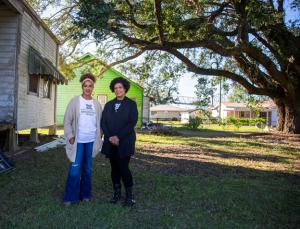
Dr. Wright featured in story of twin sisters fight to save their community in Wallace, LA
Jan 24, 2022
By Halle Parker - NOLA.com
Photo by Sophia Germer - NOLA.com
Twins Jo and Joy Banner were just 10 years old when their family was nearly forced to leave their small St. John the Baptist Parish neighborhood to make room for a Taiwanese company trying to build a rayon plant. Originally settled by the descendants of those enslaved on a nearby plantation, the Banners’ cluster of residential homes in Wallace would have been razed and replaced with the corporate offices of that company, Formosa Plastics Group. "They told my parents we had three months to get out," Jo Banner recalled. "A family of six. In three months, we had to find a home." Ultimately, the buyouts weren't finalized and the project never came to fruition; it was halted after the parish president at that time, Lester Millet, was charged with extortion and other crimes after he schemed to help Formosa build its plant.
Now 43, the Banner sisters have founded a nonprofit that is leading an effort to rid the area of the infamous deal's lingering legacy and overturn decades-old zoning changes that allow heavy industries to locate next to neighborhoods. "We are the victims of a crime that happened, and here we are, still dealing with this crime," Jo Banner said. The Descendants Project, the Banners' Wallace-based nonprofit, sued the parish in November over a 1990 zoning law that rezoned hundreds acres of farmland in Wallace from residential to industrial use. The case is still working its way through the courts; a ruling in the sisters’ favor would effectively block a $400 million grain terminal from being built near the neighborhood.
The group eventually hopes to form working groups of residents who might consider models for collective land ownership, such as community land trusts or land redistribution. Also underway is an effort to map potential burial sites in order to better protect those spaces, said researcher Jordan Brewington, who works with the twins’ nonprofit, the Louisiana Bucket Brigade and other groups.
Though the Banners have become the face of local opposition to Wallace’s zoning rules, their nonprofit actually began with a much different goal. Founded in the fall of 2020, the Descendants Project grew out of the desire to enhance the lives of others descended from the enslaved. The twins also wanted to fix the region's plantation tourism industry. The sisters argue, for example, that marketing the River Parishes area as "Plantation Country" dismisses slave experiences and takes a narrow view of what makes the area special. The sole Louisiana plantation to make the experiences of those who were enslaved its chief focus is the Whitney Plantation, where the sisters’ great-great-grandmother was born into slavery, and where Joy Banner now works as director of communications, the Banners said. Both women said that tourism jobs are a great alternative to jobs with the petrochemical plants concentrated along the Mississippi River.
"It's a way of protecting the land. It's a greener industry," Joy Banner said. "Our passion for tourism is right alongside the protection of descended communities and preventing environmental racism, or reducing environmental racism as best as we can." In Louisiana’s chemical corridor, an 85-mile stretch along the Mississippi River between New Orleans and Baton Rouge, industrial facilities are frequently built near Black and low-income neighborhoods, said Deep South Center for Environmental Justice founder Beverly Wright, who was involved in Wallace’s 1990s battle against Formosa. "I don't know how to explain the constant insult in the expansion of toxic, noxious, dangerous facilities in the same places over and over again," Wright said. "Once they start, you get zoned for everything that's dangerous. And then the facilities see it as a welcoming spot because they've already got one. They know they can get people to say yes to two, three and four." Brewington agreed that zoning laws like the ones in Wallace have long harmed vulnerable neighborhoods. "This is centuries of land-based injustice that really began with settler colonialism and the stealing of this land from indigenous folks,” Brewington said. “But we see the continuation of that violence through these zoning decisions, and through the lack of community control over how these lands are stewarded." Wright said the Descendants Project’s efforts would be a step beyond past attempts by environmental justice advocates to reduce emissions or to have companies pay to relocate residents in polluted communities.
"They're saying no, we deserve reparations for what has been done to us," she said. "This land belongs to our families, our families were born, our ancestors who have gone on this land, and we will not be moved."